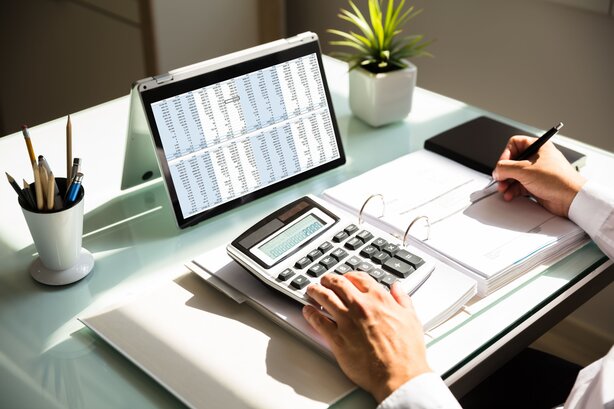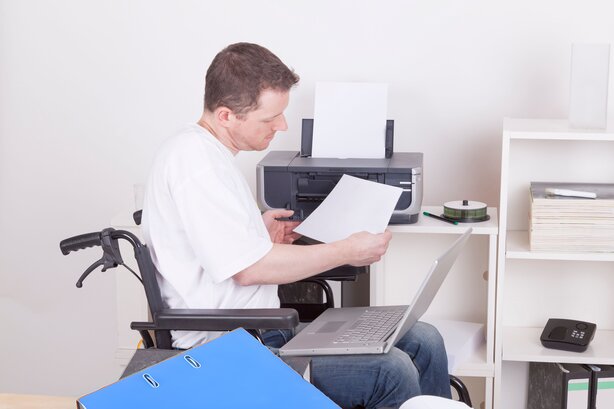What to Do If You're Self-Employed and Unable to Work Due to Illness

Self-employed persons who find themselves unable to work due to illness are in a particularly precarious position. But if they plan ahead, stay calm and take the tips provided in this guide to heart they should be able to weather the storm without compromising their long-term position.
If you are self-employed but are currently unable to work due to illness or injury, there are a number of things you should do to ensure you are able to transcend your current difficult situation. The good news is that if you have a reliable internet connection none of the following require you to leave home.
If you are self-employed you should be in the habit of keeping close tabs on your finances. That way if you find yourself unable to work for a period of time you will have a good idea of where you stand. If for some reason, however, you haven't assessed your financial situation in a while you should do so early on in your illness and create a detailed plan for dealing with essential expenses.Take Stock of Your Financial Situation

If a review of your finances has revealed storm clouds on the horizon, you should explore your options regarding financial assistance. Depending on your situation, you may be eligible for Employment and Support Allowance (ESA), Universal Credit, or other types of emergency support available.Consider Your Financial Assistance Options

If it seems as though you may have some difficulty meeting your obligations during your recovery period it is important that you contact creditors (and if necessary, suppliers), and inform them of your current situation. If necessary, ask if you can defer or reduce payments until you have made a full recovery and are back to work.Contact Creditors

Many insurance companies will provide coverage during critical illness or offer income protection should you find yourself unable to work for a time. It's crucial to assess whether your existing Insurance policy might provide suitable coverage in order to help you deal with your current situation effectively.Review Your Insurance Policies

If you have reviewed your finances and explored insurance and assistance options but remain uncertain, consulting with a financial advisor could be invaluable. They can help devise a strategy to navigate your situation successfully. Utilizing tools like the Pie Tax App can streamline your financial management, ensuring compliance and optimizing tax strategies during recovery.Talk to a Financial Advisor

Keep detailed records of your financial situation while you are incapacitated. That includes recording all correspondence with creditors and suppliers and keeping an expense log. Should you need government or charity assistance, these records will help support your case. They’ll also be a useful reminder where you stand financially.Keep Detailed Records

HMRC can also be very useful in helping direct you toward support and benefits. If you are self-employed and facing a protracted recovery period from illness or injury, you can contact HMRC to explore any available options. If you need to forego self-employment due to illness, notify HMRC that you are closing down your business.Contact HMRC

With everything going on relative to your financial situation, you could easily lose track of your recovery. Make sure that doesn’t happen. After all, you want to be sure you emerge from your current difficulties not only financially stable but physically sound so that you can resume your career without hindrance.Don’t Lose Sight of Your Recovery

Informing HMRC That You Are Giving Up Self-Employment
Should your current situation cause you, for whatever reason, to give up self-employment you must inform HMRC that, following the current tax year you will no longer be filing annual self-assessments. In addition, you will need to make sure you file your final self-employment tax return.
Informing HMRC of your change of status is a fairly straightforward process.
- Go to - https://www.gov.uk/stop-being-self-employed
- Click or tap the link that says “Tell HMRC you are stopping self-employment”
- Sign into your government gateway account
- Then follow the prompts to inform HMRC of your decision
You will need to provide your National Insurance number and your UTR in order to verify your identity and complete the process.
What Happens If a Self-Employed Person Does Not Notify HMRC That They Stopped Working?
Failing to notify HMRC that you are no longer self-employed or that you are ending/leaving a business partnership could cause your life to get very complicated. HMRC will continue to expect you to file self-assessments and when you don’t they may slap you with penalties. It is also likely that HMRC will formulate an estimated tax bill for you that is for far more than you actually owe.
What’s more, the estimated tax bill they send you is legally enforceable, meaning you can’t just brush it off as being irrelevant because you are no longer self-employed. If HMRC send you a tax bill, estimated or not, they expect you to pay it.
You may be able to get out from under an estimated tax bill but only if you notify HMRC about your changed status and file your own tax return for the same period. Be aware, however, that there are time limits involved. If you wait too long there will be no way to escape having to pay the estimated tax.
Conclusion
If you are self-employed and find yourself unable to work for an extended period of time, stay calm and follow the above tips. And if your illness or injury has made you rethink self-employment altogether, make sure you inform HMRC that you are no longer self-employed.
Want to track your tax situation more closely? Why not try out Pie App – the easy-to-use personal tax management app. The Pie Tax App is completely free to use, find out what features are included here:
How is Pie different?
Pie is the only app for self assessment with tools for bookkeeping, your live tax figure, easy tax returns and helpful advice when you need it.
Save £168 per year vs Quickbooks, file your self assessment today for free with Pie
FREE
£69
+£59.99
£149
Quickbooks
£168
per year7 features
TaxScouts
£169
per year4 features
Accountant
£450
avg per year5 features
* Optional add on
Frequently Asked Questions
What financial support can I receive if I'm self-employed and unable to work due to illness?
If you are self-employed and facing illness, you may be eligible for Employment and Support Allowance (ESA), Universal Credit, or other emergency support. Contact HMRC to explore your options.
How do I notify HMRC if I need to close my self-employment due to illness?
If your illness requires you to cease self-employment, you must inform HMRC about closing your business. This involves notifying them of your situation and completing necessary paperwork.
Can insurance cover help me financially during my illness as a self-employed individual?
Body: Many insurance policies offer coverage during critical illness or provide income protection. Review your policies to see if they can assist you during this challenging time.
What steps should I take to ensure I comply with tax obligations while unable to work?
While unable to work due to illness, it's crucial to stay compliant with tax obligations. Use tools like the Pie Tax App or consult tax professionals to manage your taxes effectively.
How can I prepare financially for future illness affecting my self-employment?
To prepare for future illness impacting your self-employment, consider setting aside emergency funds and reviewing insurance coverage options that offer income protection or critical illness cover.




